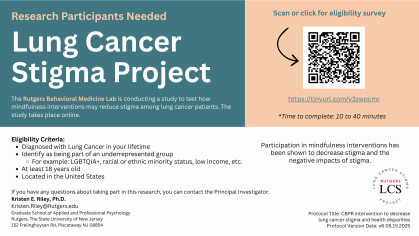Media Contact: Kim Spinelli kim.spinellli@gsapp.rutgers.edu 848-445-3966
Rutgers University’s Graduate School of Applied and Professional Psychology (GSAPP) is leading innovative partnered research and practice focused on the provision of trauma-focused care for children, adolescents, and families in schools and community settings
Exposure to trauma is a major public health issue across the U.S., with significant impact on children and adolescents’ mental health and academic outcomes. Increasing access to high quality services and improving child-serving systems, particularly for families living in marginalized communities, is a national priority made even more urgent in the wake of the COVID-19 pandemic.
Recently, GSAPP partnered with Jersey City Public Schools (JCPS), the state’s second largest school district, to implement Project Resilience: A Multi-tiered System of Support (MTSS) for Trauma-informed Schools. A $3.8 million partnership grant, funded over four years by the Substance Abuse and Mental Health Services Agency (SAMHSA), the Project Resilience MTSS framework will provide students across the district with social-emotional learning and trauma-focused, evidence-based interventions delivered in schools and clinics; provide teachers and school leaders with training and coaching in trauma-informed classroom practices; and strengthen collaborations with mental health agencies and community partners to provide mental health screening, referrals, and direct services. The research, led by Dr. Erum Nadeem, GSAPP Associate Professor in School Psychology, will focus on studying implementation outcomes and the effects of teacher coaching on student and classroom outcomes.
“It is well-documented that children and adolescents from minoritized and historically underserved communities have significant barriers to accessing high quality mental health services. By providing access to evidence-based interventions at school, we are removing what can be an insurmountable barrier for many families,” said Nadeem.
“Also critical,” said Nadeem, “is the fact that our partners at JCPS are dedicated to tending to the school, classroom, and community context. By using MTSS framework to create supportive climates and by providing ongoing coaching and support to teachers and school leaders, we have a unique opportunity to directly study the impact of healing- and resilience-promoting contexts and teacher supports.
Nadeem added, “Our role in this project is to bring our expertise in supporting students exposed to trauma at school, training and consultation models, and implementation science. We will be able to study the program’s impact, and I am grateful to be engaged in collaborative, community-engaged scholarship and practice with such dedicated partners.”
This project expands upon GSAPP’s success in providing innovative, trauma-focused care through the SAMHSA-funded Children (and Families) Healing After Trauma (CHAT) Clinic, an outpatient specialty clinic that serves youth ages 3 to 21 years old and their families referred from New Jersey Division of Child Protection and Permanency (DCP&P), local schools, mental health partners, and general community referrals. The CHAT Clinic is a Category III Community Treatment Service program under the National Child Traumatic Stress Network. Overseen by Dr. Kelly Moore, Director of GSAPP’s Center for Psychological Services, CHAT provides individual, family, group services for youth impacted by trauma in their communities. This SAMHSA-funded site, granted $2 million dollars over five years, is funded through September 2026.
According to Moore, “The long-term impact of unaddressed traumatic stress in youth is well-documented. We know that toxic, chronic, traumatic stress can impact a youth’s development and have a cascading effect on their ability to cope, learn, and live a healthy life. We also know that unaddressed/untreated trauma can increase risk of children becoming adults who may unintentionally repeat cycles of trauma in the next generation. CHAT’s work aims to provide evidence-based interventions for youth and families to help them process their trauma and strengthen their resiliency to mitigate these long-term impacts.”
GSAPP prides itself on conducting inventive, impactful research to serve the common good, particularly underserved communities. For more information, visit: https://gsapp.rutgers.edu. Its School Psychology program offers its own MTSS academic career path. Click here to learn more: Multi-tiered Systems of Support.




